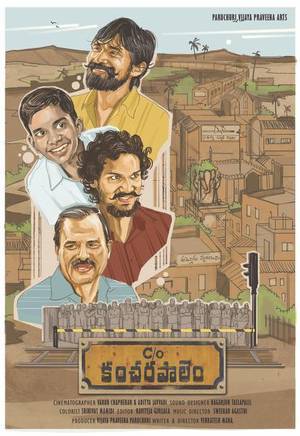‘Care of Kancharapalem’ is a brave little indie riding a new wave in Telugu cinema
Care of Kancharapalem is a rare Telugu film that takes us beyond the habitual cinematic settings to familiarise us with the sights, sounds and lives of people of a locality. In those narrow lanes of Kancharapalem in Vizag, there’s no place for secrets. Everyone goes about their lives and yet, they are bothered about what’s happening (or not happening) in someone else’s life.
That 49-year-old Raju is still unmarried is an issue. Raju cannot get away saying things just didn’t work out for him and he’s happy with his singleton status. The inmates of the locality hold a meeting to discuss what stops him from getting married. Someone questions his virility, others wonder if he’s gay or can cause harm to their children.
The humour with which all these are presented gently ease us into this slice-of-life narrative that presents four romances — of school children Sunita and Sundaram, a young Bhargavi and Joseph, 30-something Gaddam and Saleema, and that of Raju and an officer from Odisha whom he addresses as madam.
We’ll stick to the character names for now, because they seem so real. Most of the actors have been hand-picked from Kancharapalem and have no acting experience, but breathe life into the narrative. Saleema is played with aplomb by the film’s producer Dr Paruchuri Vijaya Praveena, who had the gumption to back this small indie film with a large heart.
Director Venkatesh Maha makes an emphatic debut. He leads us into Kancharapalem as the opening song raises questions on life. Raju begins his morning with yoga and a fast-paced walk that he calls a jog. The yoga-walk routine later helps him befriend Radha, the 42-year-old lady officer from Odisha who bats for equality by insisting Raju sit with the rest of her colleagues at the dining table.
Elsewhere, Sundaram desperately hopes to catch the attention of Sunita. A song book of Marocharitra’s ‘Bhale bhale magadivoy’ is a catalyst to their innocent friendship, as the children remain oblivious to the meaning of the lyrics.
- Cast: Subba Rao, Karthik Ratnam, Paruchuri Vijaya Praveena, Mohan Bhagat, Praneetha Patnaik, Radha Bessy and others.
- Direction: Venkatesh Maha
Joseph who does odd goonda jobs at the behest of his gym instructor (another terrific casting of a local who nurtures political dreams), crosses paths with the feisty Bhargavi.
Then there’s Gaddam who works at a wine shop and takes a shine to Saleema. He’s drawn to her sharp eyes visible through the scarf-covered face and is unflinching in his commitment to her, even after learning that she’s a hooker. When she tells him her mother died of AIDS, he knows he cannot stop her from doing her work at least for now, and sends her with a condom.
Amid these four love stories that develop parallely, Venkatesh Maha slips in pertinent issues of gender sensitivity, the fight for dignity of labour, and differences in religion and social strata.
We root for the stuttering, skilled artisan who stakes all his savings to make one large Ganesh idol that he hopes will offer him monetary gains and recognition.
Religion becomes a monster in the Bhargavi-Joseph story. Intermittently, Raju states that neither does he differentiate between religions, nor does he have a strong religious affinity. Gaddam doesn’t think twice before courting Saleema and hints that he’s willing to convert. All these dots connect to paint a poignant larger picture.
Kancharapalem’s fault lines run deep and it takes strong-willed personalities to rise above it. In one of the best scenes of the film, a mother in her 40s asks her 20-year-old daughter what’s the point of her feminism if she cannot accept that her widowed mother, too, would want a second chance at matrimony. The ensuing mother-daughter bond and what happens to the romance deserves a thumbs up.
Unknowingly, this film takes you into its fold. The cinematography by Varun Chaphekar and Aditya Javvadi, and Sweekar Agasthi’s music stayed with me long after the film was over. The trains that pass through the town are also used skilfully in the narrative.
After the final reveal that connects the threads of the anthology, I wanted to know if a pivotal character felt remorse over something done inadvertently earlier? Did the character brood in private over life’s unpredictable ways? And some more.
However, this thoughtfully crafted brave little indie deserves to be lauded. These are signs of better times for Telugu cinema indeed.








